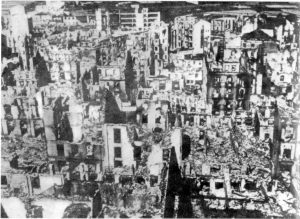 THURSDAY (26 April) will be the 80th anniversary of the bombing of Guernica in the Spanish Civil War. It is perhaps timely to reflect on it, given the emphasis on bombing in the past couple of weeks: the bombing of Syria “in retaliation” for the use of chemical weapons; the Mother of All Bombs being dropped in Afghanistan; and the threats by North Korea to pre-emptively use nuclear bombs.
THURSDAY (26 April) will be the 80th anniversary of the bombing of Guernica in the Spanish Civil War. It is perhaps timely to reflect on it, given the emphasis on bombing in the past couple of weeks: the bombing of Syria “in retaliation” for the use of chemical weapons; the Mother of All Bombs being dropped in Afghanistan; and the threats by North Korea to pre-emptively use nuclear bombs.
The significance of Guernica is that it was the first time that civilians were deliberately targeted in an air attack; it was the first time that a population centre was carpet bombed from the air; and it was one of the first times that a population was used as a target from the air by a foreign power (fascist Germany and Italy) to test the effectiveness of its aircraft and the effectiveness of terror on the civilian population.
Guernica changed the mode of war. Before then, civilians in cities and towns away from the front were by and large relatively safe. In wars before then air power was not capable of such bombing attacks. In World War I, by and large, troops slugged it out in trenches on the front and there was no air war.
For three hours on the afternoon of Monday 26 April 1937, a market day in which the town’s population was swollen from 7000 to 10,000, bombers from the German Luftwaffe’s Condor Legion and the Italian Legionary Air Force, in wave after wave demolished the town in a grid pattern of carpet bombing. The town had no air defences.
The only genuine military target, a bridge which might have been used by retreating troops was left intact.
Guernica was less a military target than a symbolic one that would have a great effect on the Basque population because it was and still is considered the spiritual capital of Basque people and the home of Basque liberty.
Fascist Generalissimo Franco’s rebel nationalist forces wanted a quick victory in the northern Basque region which had stayed loyal to the republican government, so he could have a stronger force to attack the capital Madrid.
Propaganda played a commensurately larger part in the Spanish Civil War than any before it. Radio played a part for the first time. Newspaper reporters could get their stories out more quickly with technological improvement.
News of the Guernica atrocity hit the international press within a couple of days.
Franco’s side lied by blaming the destruction on a scorched-earth policy by the republicans. The republicans for their part exaggerated the death toll at 1650. Later research put it at about 400.
The power of the propaganda combined with human interest in new turns of events is shown by the fact that the death toll was relatively low compared to the historic significance of the event. It spawned an artistic and literary outpouring.
In a way, this first-time abuse of air power changed the moral dimension of war. At Guernica, pilots high in the sky with little or no chance of being shot down and with very little risk, could inflict death, injury and destruction on a civilian population.
The propensity is for humans to use whatever power is available to them. In the context of North Korea’s nuclear ambitions and the erratic leadership in the US which is facing it, this is frightening.
Who will bother about rules in an all-out war involving existential threat?
Luftwaffe chief Herman Goering admitted at the Nuremberg trials that the Luftwaffe had used the Spanish Civil War as a practice run, and Guernica was the starting point of the new horror. Rotterdam, London, Coventry and Dresden followed in Europe and Hiroshima and Nagasaki in Japan.
What is a legitimate target from the air? Purely military? Industrial as well? Mixed industrial and civilian, with the civilians being described as “collateral damage”? Demonstration of overwhelming superiority to force capitulation to save your own side’s soldiers irrespective of the enemy’s civilian deaths, as in Hiroshima? Another demonstration to hurry things along, as in Nakasaki? Shock and awe bombing of a regime on mere suspicion of it having weapons of mass destruction, as in Iraq? Drone bombing of suspected terrorists?
There are no easy answers.
But we have a new one now: would a pre-emptive strike against North Korea be justified in the face of the announced certainty that it has nuclear weapons, the means to deliver them, and credible intelligence that it is about to do so?
The North Korea situation has similarity with the Spanish Civil War – war by proxy. In Spain, fascist Germany and Italy supplied arms to the Franco rebels and the Soviet Union supplied the republican government. A lot of other proxy wars followed, especially during the Cold War.
Now the Cold War is slowly being replaced by US-China tension and North Korea is a major part of it.
Add to this mix the US propensity to engage in war even if not attacked or under a UN umbrella: 1898 with Spain, World War I, Cuba’s Bay of Pigs, Vietnam, Afghanistan (none of the twin tower terrorists was Afghani) and Iraq. The last four are prima facie war crimes under the category of waging an aggressive war.
Further, the US military was keen for a nuclear war over the Cuban missle crisis and only the calm resolve of JFK prevented it. The US leadership is nto like that now.
So the best hope now must be China. North Korea feels it must have deliverable nuclear weapons as insurance against an invasion by the US or South Korea that would topple the regime. Regime survival at all costs in the North Korean position. The US and South Korea, on the other hand, feel that they must prevent North Korea getting nuclear weapons at all costs. That is an unstable war-war set of options.
If only China could be persuaded to tell the North Korean regime that its nuclear option will be met by Chinese sanctions so crippling that the regime would topple anyway and that any nuclear program could not be maintained – a peace-peace option.
If only China could be persuaded that a non-Communist north or even a unified Korea is a better option than a drift to nuclear war. A persuading point would be that such a conflict would threaten the Chinese regime as well.
CRISPIN HULL
This article first appeared in The Canberra Times and other Fairfax Media on 22 April 2017.
 THURSDAY (26 April) will be the 80th anniversary of the bombing of Guernica in the Spanish Civil War. It is perhaps timely to reflect on it, given the emphasis on bombing in the past couple of weeks: the bombing of Syria “in retaliation” for the use of chemical weapons; the Mother of All Bombs being dropped in Afghanistan; and the threats by North Korea to pre-emptively use nuclear bombs.
THURSDAY (26 April) will be the 80th anniversary of the bombing of Guernica in the Spanish Civil War. It is perhaps timely to reflect on it, given the emphasis on bombing in the past couple of weeks: the bombing of Syria “in retaliation” for the use of chemical weapons; the Mother of All Bombs being dropped in Afghanistan; and the threats by North Korea to pre-emptively use nuclear bombs.
Actually, there was some bombing of British cities by Zepplins in WWI. Between the wars there was a widespread belief that future wars would be decided by aerial bombing of civilians which would destroy a country’s will to fight. Hence the elaborate civil defence planning by the British authorities, which also assumed chemical weapons would likely be used – “carry your gas mask at all times”. In the event British morale was not broken by the Blitz, despite which elements of their High Command remained quite sure the Germans’ would be. (One result of this wrong-headedness was the death of thousands of Australian aircrew, a fact not often commented upon these days). The unequivocal success of the atomic bombs on Japan one must attribute to the “shock and awe” created by massive destruction coming literally “out of the blue” rather than from a “thousand bomber raid”.
I think China would prefer a communist nth korea. All their expansian into china sea with artificial islands would be futile if US and Sth korea overthrew nth korea. So i suspect china will use economic and perhaps some military threat to contain or topple kim.
The US would need massive forces of at least 3 aircraft carriers, thousands of cruise missiles and b2 bombers. Nth korea has spies in sth korea and japan so no surprise air attack could be launched from land.
Massive numbers of special forces would also need to be secretly inserted prior to air strike. US would need to win in under an hour.
For US/Sth Korea to “win”, sth korea would need to be protected from tens of thousands non-nuclear rockets. A succesfull Nth Korean nuclear launch would mean US loses, as they would be guilty of pre-emptive attack, something as you have pointed out they often do.
Remember a nuclear device does not need to be launched, it can be in a sub (nth korea has many), or simply a fishing vessel. That means US would also need a large array of destroyers which kim could see coming and heaps of attack subs, but who knows nth korea would most likely have a nuke outside any possible blockade zone.
So risk is way too high for US invasian, leaving China as the logical solution.